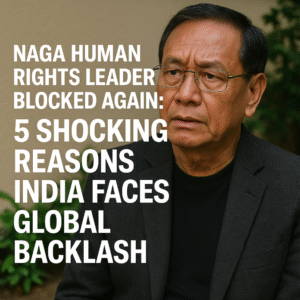Naga Human Rights Leader Blocked Again: 5 Shocking Reasons India Faces Global Backlash
Neingulo Krome, Secretary General of the Naga Peoples’ Movement for Human Rights (NPMHR), was barred from traveling to a Kathmandu conference on April 7 by Indian authorities—the second such incident since 2020. Prominent Naga civil groups, including the Naga Students’ Federation and Naga Scholars’ Association, condemned the move as systemic oppression targeting indigenous voices. Krome, a longtime advocate for peace and indigenous rights, has faced repeated harassment, including surveillance and bureaucratic obstruction.
Critics argue the travel ban violates India’s constitutional guarantees (Article 21) and international law (UDHR Article 13), reflecting broader marginalization of Nagaland’s decades-long struggle for self-determination. The region remains militarized under laws like AFSPA, which activists claim enable rights abuses. The incident spotlights India’s contradictory stance on democratic freedoms, drawing calls for UN intervention to uphold indigenous rights.
As pressure mounts, the government’s response risks eroding its global credibility while deepening distrust among Nagas and other marginalized communities.

Naga Human Rights Leader Blocked Again: 5 Shocking Reasons India Faces Global Backlash
The Indian government faces mounting criticism after Neingulo Krome, Secretary General of the Naga Peoples’ Movement for Human Rights (NPMHR), was barred from boarding a flight to Kathmandu on April 7. This incident, the second such travel restriction imposed on Krome since 2020, has sparked condemnation from prominent Naga civil society groups, who accuse authorities of systemic oppression against indigenous voices.
Who is Neingulo Krome?
Krome is a veteran human rights advocate and a pivotal figure in Nagaland’s decades-long struggle for self-determination. As NPMHR’s leader, he has consistently highlighted alleged militarization, draconian laws like the Armed Forces Special Powers Act (AFSPA), and rights violations in India’s Northeast. His work with international bodies, including the UN, has amplified indigenous Naga concerns globally.
The Incident: A Recurring Pattern of Suppression
On April 7, Krome was detained at Delhi’s Indira Gandhi International Airport without explanation while en route to a meeting organized by the Asia Indigenous Peoples Pact (AIPP). In 2020, he faced similar obstruction at Kolkata Airport when traveling to Bangkok. Both instances involved officials stating only, “You cannot travel,” bypassing legal protocols.
Civil Society Backlash: Voices from Nagaland
Three influential organizations—the Naga Students’ Federation (NSF), Naga Scholars’ Association (NSA), and Zuketsa Area Public Organisation (ZAPO)—have denounced the travel ban as emblematic of broader state repression:
- NSF labeled the act a “calculated attempt to erase Naga identity,” linking it to historical marginalization and restricted movement due to cross-border kin separations.
- NSA criticized the “normalization of repression,” noting Krome’s prior encounters with surveillance and bureaucratic harassment.
- ZAPO underscored violations of India’s constitutional guarantees (Article 21) and international law (UDHR Article 13), urging accountability.
Legal and Human Rights Implications
India’s Supreme Court has repeatedly affirmed that freedom of movement is intrinsic to the right to life (Article 21). Arbitrary travel bans contravene not only domestic law but also the UN Declaration on the Rights of Indigenous Peoples (UNDRIP), which India endorsed in 2007. Krome’s case highlights a troubling disconnect between India’s democratic ideals and its treatment of dissenters, particularly from conflict-ridden regions like Nagaland.
Historical Context: The Naga Struggle
Nagaland, a state in India’s Northeast, has endured a complex conflict since the 1950s, with groups seeking sovereignty or greater autonomy. The region remains heavily militarized under AFSPA, which grants security forces sweeping powers. Activists like Krome argue such laws enable impunity, fostering cycles of violence and censorship.
International Repercussions
By targeting indigenous advocates, India risks undermining its global standing as a rights-respecting democracy. NSF’s call for UN intervention pressures New Delhi to align its actions with UNDRIP commitments. The incident also raises concerns for other marginalized groups facing similar silencing tactics nationwide.
Conclusion: A Test for India’s Democracy
Krome’s travel denial transcends individual grievance—it reflects entrenched strategies to stifle dissent in contested regions. As civil society demands transparency and restitution, the government’s response will signal its commitment to pluralism and rule of law. For Nagas and indigenous communities globally, this case underscores the urgent need to protect civic space and uphold hard-won rights in an increasingly authoritarian climate.
You must be logged in to post a comment.